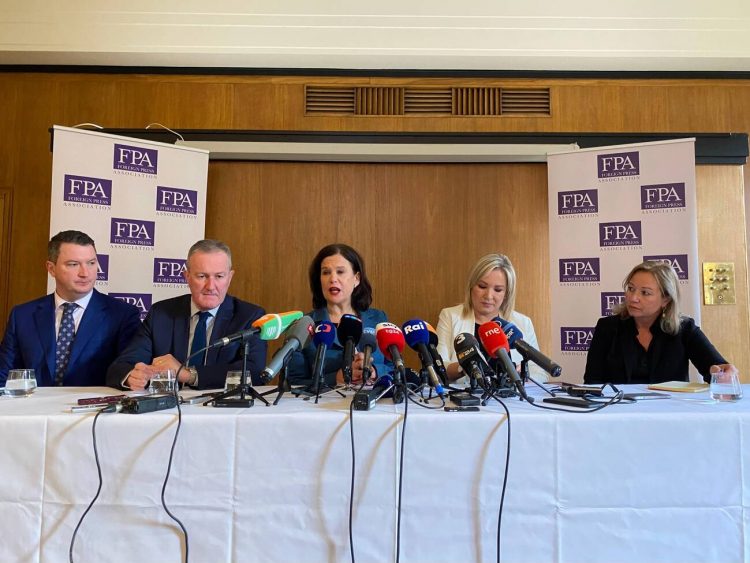As part of the European Union, Ireland has taken legal action against the UK at the European Court of Human Rights (ECHR) regarding contentious legislation linked to the Northern Ireland conflict. The UK’s move to enact laws independently, disregarding Ireland’s input and worries, prompted Ireland to complain. Prime Minister Leo Varadkar stated that
the court will be requested to assess the legislation judicially. Ireland intends to pursue this matter through the European Court of Human Rights in Strasbourg. This article deals with the Irish legal challenge to British actions.
Background of the Good Friday Agreement
For years, Catholic nationalists advocating for Irish independence and Protestants supporting Britain engaged in conflicts across different regions, resulting in the loss of thousands of lives. The culmination arrived on April 10, 1998, through the Good Friday Agreement, also known as the Belfast Agreement. This landmark pact mandated the complete integration of the European Convention on Human Rights into Northern Ireland’s legal framework. Consequently, the agreement brought an end to three decades of violence and strife between Catholic nationalists seeking Irish independence and Britain-supporting Protestants. The Troubles, as these conflicts were known, ceased following the agreement’s signing, marking the conclusion of a period where over 3,500 individuals perished. The UK government has initiated investigations into approximately 1,200 of these deaths.
The Impact of the Troubles Legacy Act
The Irish legal challenge to British actions was launched after the British commitment was breached. According to the controversial new law that was approved in the British Parliament in September, a fact-finding commission will be formed, and if British security personnel and militia cooperate with this commission, they will be granted amnesty. With the so-called “Northern Ireland Troubles Legacy Act,” there will no longer be any criminal or civil trials for murder and other injustices caused by the civil war. Families of those killed during three decades of violence have rejected and condemned the passage of such a law. The wars and conflicts that started in Ireland in the late 1960s lasted about three decades.
Northern Ireland’s political factions criticise Britain
Irish legal challenge to British actions is in a situation where political factions criticise the UK government’s unilateral decision. Relatives of the victims of crimes accuse the Conservative government in London of primarily wanting to protect British veterans from legal consequences with this law. In addition to the Irish government, all factions of the political spectrum in Northern Ireland also oppose this law. Criticism has come from the Council of Europe, the United Nations, and American politicians.
The Deputy Prime Minister of Ireland strongly criticised the UK
Ireland’s Deputy Prime Minister, Micheal Martin, expressed his country’s belief that the law directly contradicts Britain’s obligations as per the ECHR. Criticising Britain for unilaterally pushing through the law without considering concerns, Martin highlighted that the British government’s action left them with no political recourse, only a legal avenue. He emphasised, “The decision by the British government to pursue legislation independently, disregarding our valid concerns and those of many others, severely limited our choices.” Martin staunchly advocated that under the Northern Ireland Troubles Legacy Act, criminal and civil trials concerning murders and injustices from the Civil War era should no longer persist in these areas of Britain. He reiterated that he had consistently raised concerns at every opportunity and urged London against passing the law.
On the other hand, British veterans have welcomed adopting this law. They say the ex-soldiers have been subjected to an unfair prosecution. Last year, British soldier David Holden was given a three-year suspended sentence for killing a man at a checkpoint in 1988. Last week, a judge in Northern Ireland said one of the veterans was to stand a murder trial. It is said that this British veteran is accused of killing 13 civilians on Bloody Sunday in 1972.
Irish legal action fringes for Rishi Sunak
Ireland’s legal action looks set to create new challenges for British Prime Minister Rishi Sunak’s government in the coming days. Reacting to the Belfast decision, the UK government’s Northern Ireland Office said it deeply regrets the Irish government’s decision to “launch this unnecessary case against the UK”. “This decision comes at a critical time,” Northern Ireland Secretary Chris Heaton-Harris said in a statement. “It did not need to be taken now, given the issues are already before the UK courts.” He said the UK government will vigorously defend this law. Mr. Heaton-Harris added that the purpose of this law is to persuade more survivors to provide more information in this regard.
The possibility of intensifying the tendency to independence in Northern Ireland
The Northern Ireland Troubles Legacy Act could lead to renewed tensions between Northern Ireland and the UK government. Although the independence referendum has not been held in Northern Ireland, the tendency towards independence in Northern Ireland has increased, especially after Brexit. In the European Union, there is a strong tendency towards Northern Ireland, as the people of Northern Ireland consider themselves strongly pro-European Union. New problems in relations between Northern Ireland and the British Conservative government could re-invigorate the independence debate in Northern Ireland. With the new legislation in the British Parliament, many Northern Irish people think that the British government does not care about them.
The importance of the UK general election for Northern Ireland
Next year’s general election in the UK is very important. If the Conservative Party wins this election, the message to Northern Ireland is that a party that is not very popular in Northern Ireland will rule you again. On the other hand, if the Labour Party wins this election, as opinion polls show, it is more likely that the Northern Irish people will find more power to determine their destiny in various fields such as budget, expenses, and taxes. Due to the opposition of the political factions to the Northern Ireland Troubles Legacy Act, the political atmosphere in Northern Ireland is also tense, and many Northern Irish officials are taking a stand against the UK government.





























